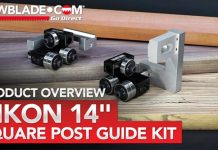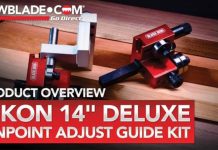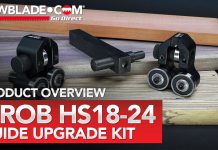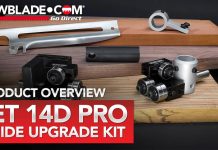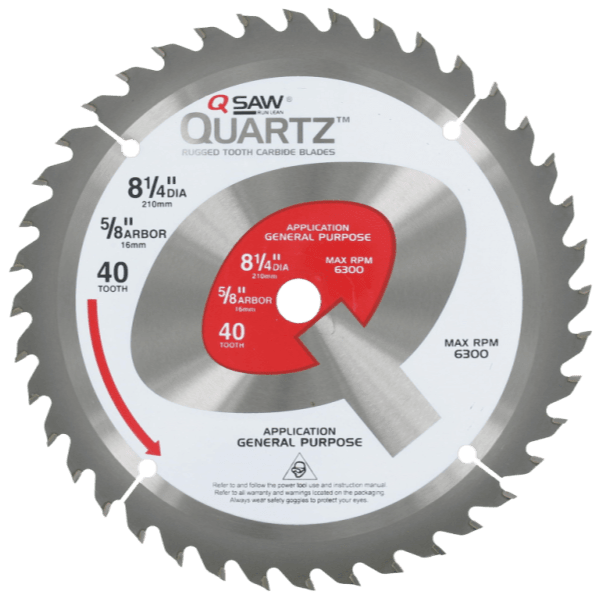When working with structural steel, the quality of your tools can make a significant difference in performance and efficiency. Bimetal blades have become a preferred choice for professionals due to their durability and precision. These blades, made from two types of metals, combine flexibility and toughness, making them ideal for cutting through thick, hard materials like I-beams, pipes, and steel tubing. Let’s explore the best bimetal blades available for structural steel and why they stand out in the industry.
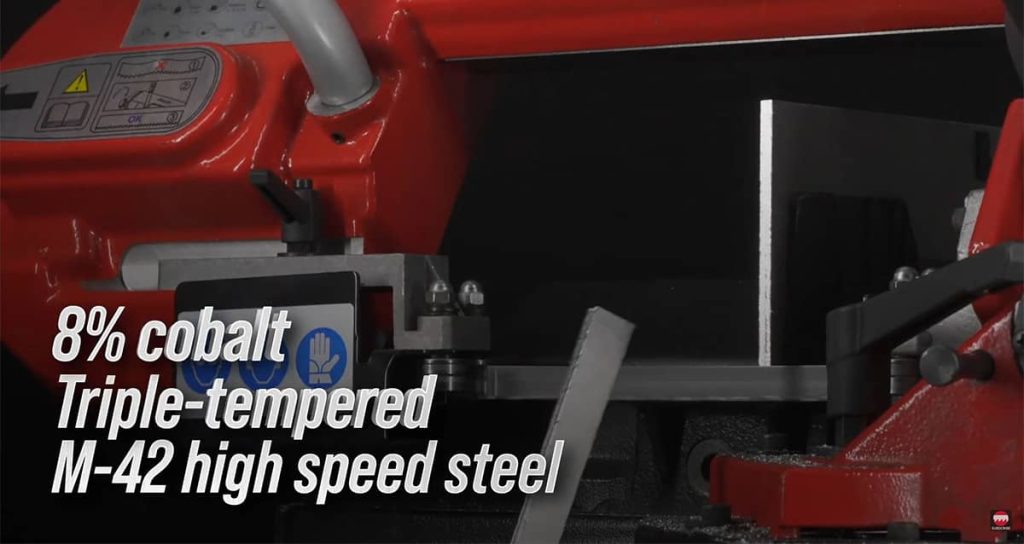
Key Features to Look for in Bimetal Blades
When choosing the right bimetal blade for cutting structural steel, several key features are essential for ensuring clean, efficient cuts and maximizing the blade’s lifespan. Here are some of the most important aspects to consider:
- Hardened Teeth: Provides strength to handle tough materials like steel and prevents premature wear.
- Heat Resistance: Reduces the risk of dulling due to overheating during prolonged cutting.
- Wide Tooth Pattern: Promotes smoother cuts and helps reduce heat build-up.
- Bundle Cutting Capability: Enables you to cut multiple pieces of steel at once, increasing efficiency.
- Compatible with Multiple Saws: Choose blades that work across different saw models for added versatility.
Q501 Series Blade: A Top Choice for Structural Steel
The Q501 series blade is one of the best options available for cutting structural steel. Designed specifically for this purpose, it comes equipped with features that enhance both performance and blade longevity. Its hardened teeth make quick work of materials like I-beams and square tubing, while its design minimizes vibration to avoid common issues like tooth stripping.
Additionally, the Q501’s ability to cut multiple pieces of steel at once (bundle cutting) makes it highly efficient for large-scale jobs. Whether you’re working on industrial projects or cutting smaller sections of steel, this blade ensures durability and precision with each use.
Tooth Pitch and Cutting Performance
Tooth pitch refers to the spacing between the teeth on a blade, and it plays a critical role in the performance of the blade when cutting different thicknesses of steel. For structural steel, choosing the right tooth pitch is essential for achieving smooth, fast cuts.
Blades with larger tooth pitches (like 8/11) are excellent for thicker materials, while finer tooth pitches (like 46) are better suited for thinner materials. Selecting the appropriate tooth pitch can prevent overheating and help achieve more accurate results, reducing the need for post-cut finishing.
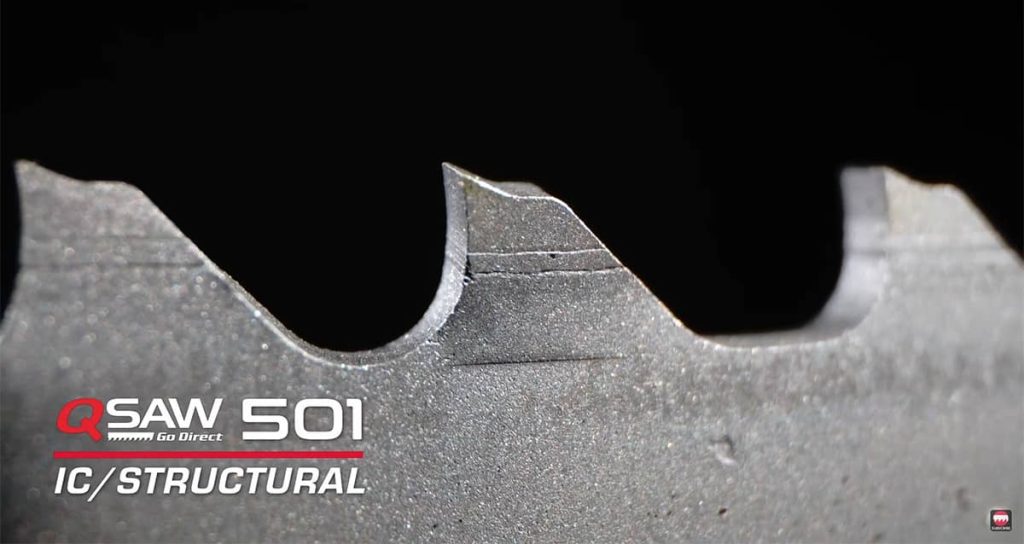
Comparison of Popular Bimetal Blades
Here’s a comparison of some top bimetal blades that are ideal for cutting structural steel, including key features and specifications:
| Blade Model | Width | Tooth Pitch | Special Features | Saw Compatibility |
|---|---|---|---|---|
| Q501 Series | 3/4″ to 2″ | 8/11 | Hardened teeth, bundle cutting capability | Metal-cutting saws |
| Lenox Classic Pro | 1″ | 10/14 | Versatile cutting performance, heat-resistant | Wide range of saws |
| M.K. Morse Cobalt | 3/4″ | 6/10 | Exceptional durability and heat resistance | Metalworking saws |
| Starrett Intenss Pro | 1″ | 8/12 | Long-lasting and sharp, great for structural steel | Heavy-duty band saws |
Blade Maintenance for Longevity
Proper blade maintenance is key to getting the most out of your bimetal blades. Even the most durable blades require regular care to ensure consistent performance. Regularly inspecting the blade for wear, keeping it clean from metal debris, and adjusting the saw’s speed for specific materials can significantly extend the life of your blades. Additionally, proper storage and lubrication prevent rust and keep the blade in peak condition.
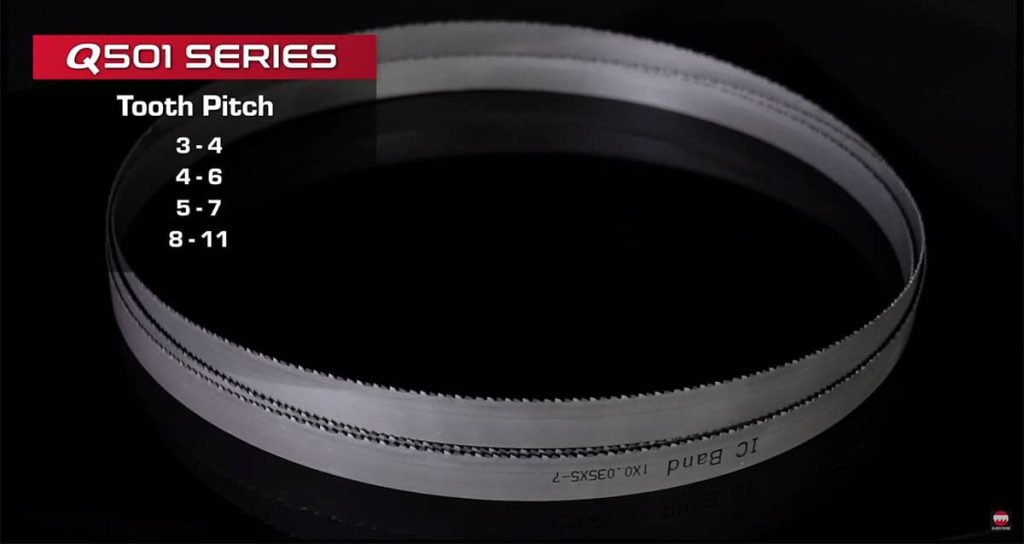
Advantages of Bundle Cutting
- Increased Efficiency: Allows you to cut multiple steel pieces at once, saving time and effort.
- Reduced Heat Build-up: Helps prevent excessive heat, which can dull the blade and compromise cutting quality.
- Cost-Effective: Fewer blade replacements due to less wear, reducing operational costs.
Explore More at Sawblade.tv for Expert Tips and Product Demos
For more in-depth knowledge about saw blades, cutting tools, and industry insights, visit Sawblade.tv. This platform is packed with valuable resources, including product videos, technical tips, customer stories, special event highlights, and blogs. Whether you’re looking to improve your technique or learn more about specific products, Sawblade.tv offers everything you need to stay informed and get the most out of your tools. Check it out today for expert guidance and firsthand experiences!
Choosing the right bimetal blade for structural steel cutting is crucial for achieving efficient, precise results. Blades like the Q501 series offer specialized features such as hardened teeth and bundle cutting capabilities, ensuring high performance in demanding applications. By understanding key factors like tooth pitch and maintenance requirements, you can optimize your cutting processes and extend the life of your tools, making your projects more productive and cost-effective.



